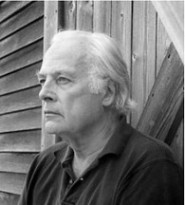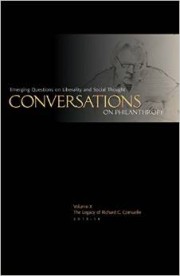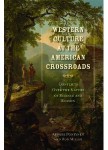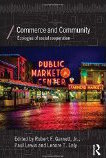Richard Cornuelle’s Quest for Community: Reflections on “De-nationalizing Community”
Introduction
For a man whose obituaries almost universally and exclusively affixed to him the label “libertarian,” it may be surprising to hear that Richard Cornuelle described himself, in his presentation to the Philanthropy Roundtable entitled “De-Nationalizing Community,” as a “closet communitarian for most of my life.” He even claimed to have been “honored recently when a libertarian critic included me in his denunciation of Amitai,” referring to his fellow panelist Amitai Etzioni, the liberal sociologist widely acclaimed as the founding theorist of modern communitarianism (1996, 10).
Yet this unusual and perhaps perplexing alignment of allies and antagonists was apparent early on in Cornuelle’s career. In the January 16, 1970, issue of Commonweal, Etzioni remarked, “reluctantly, liberal Democrat that I am, I must admit that the Nixon Administration has come up with a rather good idea.” That idea, based on Cornuelle’s writings, was “Nixon’s plan to activate a large variety of private citizens, groups, and institutions to launch and fuel overdue domestic reforms” (426).
Even then, critics denounced what they regarded as Cornuelle’s apostasy from his early libertarian beliefs, acquired at the feet of Ludwig von Mises himself. In the first issue of The Libertarian (March 1, 1969), Murray Rothbard penned a scathing attack on “Creeping Cornuellism.” Nixon’s (and Cornuelle’s) plan to activate private groups, in Rothbard’s view, had about it “the smell of Mussolini’s fascism, in which coercive government multiplied its power by mobilizing the support of masses of misguided ‘volunteers’ from among the citizenry” (2).
But Cornuelle’s willingness to seek out unusual allies, even at the cost of upsetting those who should have been his political friends, was one of the most admirable features of his career, one that should be studied and emulated.
Defining and Redefining Community
Unlike so many of those friends, Cornuelle seemed to be driven by what Robert Nisbet (another sociologist much admired by Cornuelle) described as “the quest for community” (1990 [1962]). According to the standard political configurations of our day, that should have been enough to classify Cornuelle as a modern progressive liberal rather than a conservative or libertarian, for the latter tend to regard “community” as one of those cloying, sentimental expressions that trip far too readily off the tongues of bleeding-heart liberals.
But Cornuelle’s understanding of community defied such simple categorization. As he makes clear in “De-Nationalizing Community,” he could by no means embrace modern liberalism’s understanding of that concept. For liberalism had, in the twentieth century, turned its back on community’s “natural” forms—family, neighborhood, congregation, ethnic and voluntary association—within which citizens come together, directly and immediately, to solve their own problems according to their own moral and spiritual convictions. For Cornuelle, as for Tocqueville, only such small, local community associations could draw the otherwise isolated democratic individual into the vigorous, stimulating, socializing, and humanizing practice of self-governance, learned by undertaking public affairs together with one’s fellow citizens.
In place of local community, modern liberalism had instead devoted itself to the establishment of a great national community—a monumental effort to summon citizens out of their partial, parochial, ostensibly contemptible local allegiances in order to bring together one vast, tightly knit, integrated, continent-spanning family. Within that great community, as Herbert Croly famously put it, there would be a “subordination of the individual to the demand of a dominant and constructive national purpose.” A citizen would begin to “think first of the State and next of himself,” and “individuals of all kinds will find their most edifying individual opportunities in serving their country.” Indeed, America would come to be bound together by a “religion of human brotherhood” which “can be realized only through the loving-kindness which individuals feel . . . particularly toward their fellow-countrymen” (1989, 453).
This great national community would be bound together not only by unifying sentiment but also by a vast, centralizing, rationalizing federal bureaucracy. The latter would be staffed by professionals trained in the new social sciences, which for the first time would provide objective, neutral, universally accepted techniques for efficiently managing the national community, replacing contentious local political action with manifestly nonpartisan, centralized directives.
The old, clumsy, amateurish efforts of citizens to meet their own needs locally, at the bottom, would now be replaced by the smoothly humming delivery of social services from the top, managed by scientifically trained experts who alone could master the complex social and economic forces rapidly rendering local community obsolete and unsustainable. Self-governing citizens were no longer necessary nor desirable—they only cluttered up the process. It was best that they be reduced to compliant “clients” passively and gratefully consuming the expert services now so effectively delivered by government agencies.
As Cornuelle points out, modern philanthropy was neck-deep in these developments. The first large American foundations—Rockefeller, Carnegie, and Russell Sage—were ardent converts to the enormous potential of the modern social sciences, funding the first research universities where they were developed and taught; the first think tanks, where they were systematically applied to public policy; and the first national demonstration projects, which were designed to blaze the trail for larger, federally funded replicas.
But Cornuelle insisted that denationalizing—rather than nationalizing—community was the direction we must take, thus estranging himself from the great liberal project of the twentieth century. That did in fact push him much closer to the libertarian movement of his day, especially since dissent from the national community project seemed to be limited at mid-century to a handful of struggling, obscure libertarian economists such as his teacher, von Mises.




